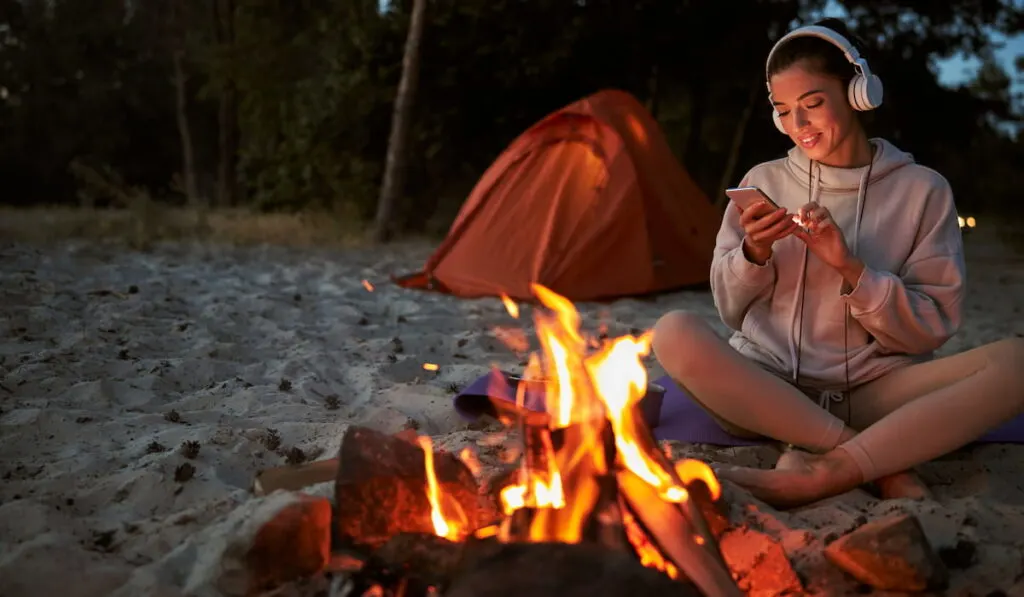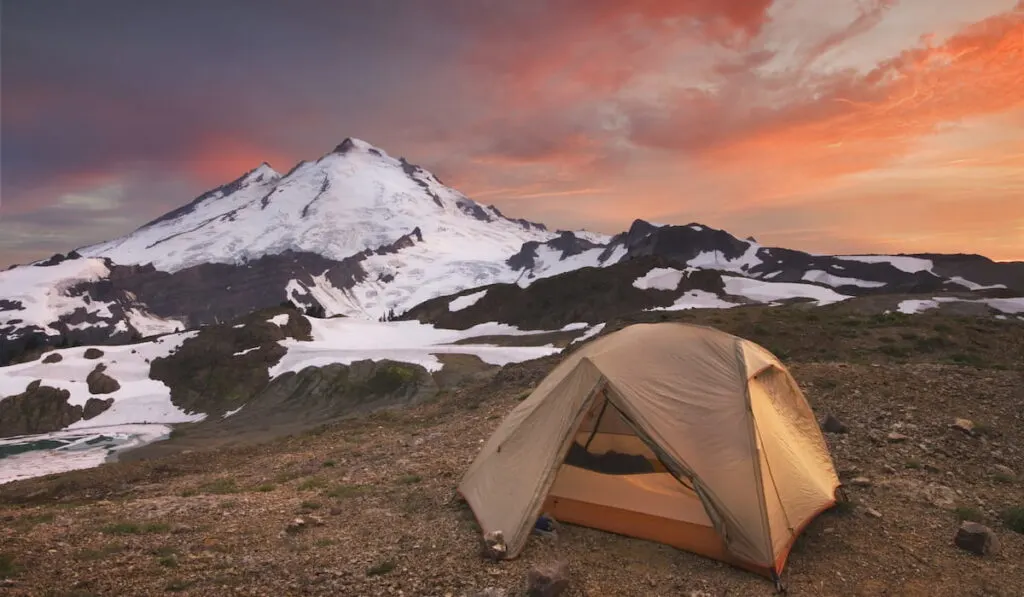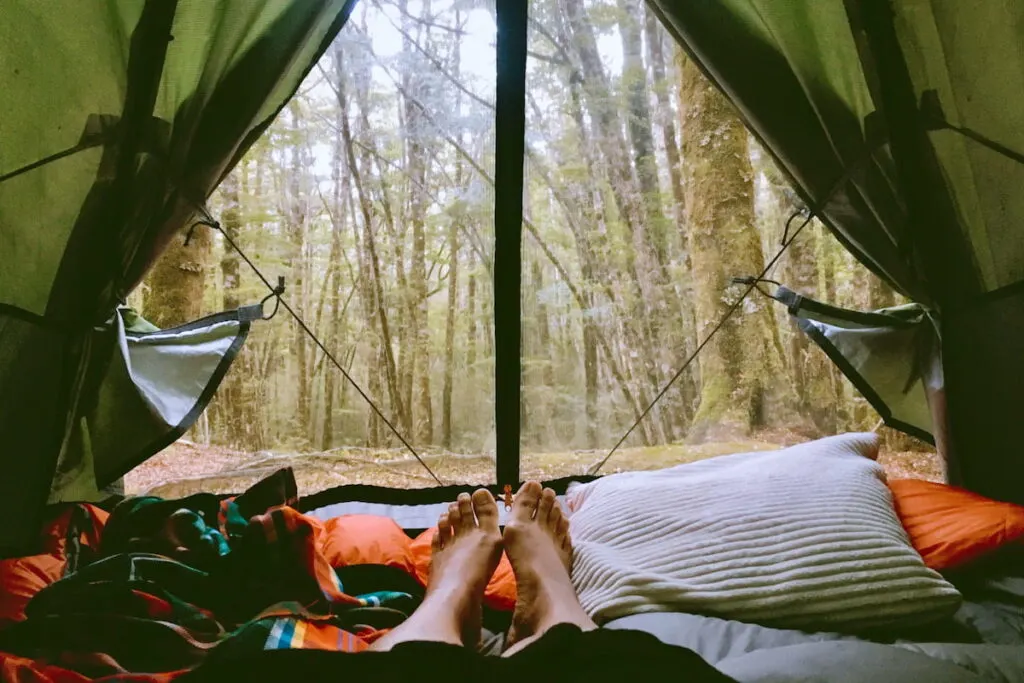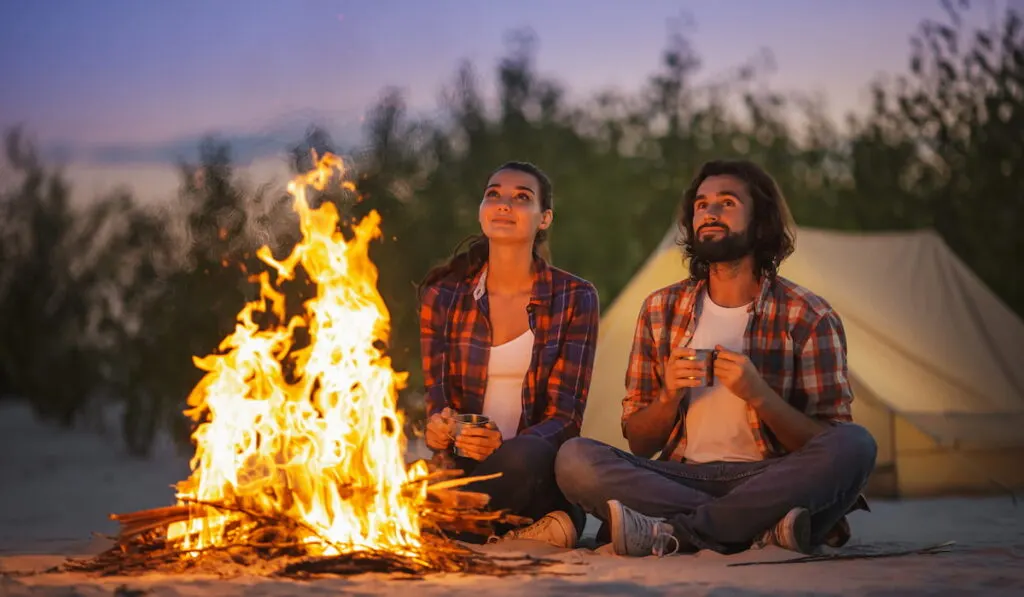There are so many things that you can do while camping. However, the location of your campsite plays a big part in what you can do.
While there are many places to camp, we sometimes hear words such as front country or backcountry camping.
What are the meanings and differences between front and backcountry camping?
Front country camping simply means camping on a site that is completely reachable by a vehicle and is mostly connected to the internet. However, backcountry camping means camping at a completely or slightly remote site without access to the internet and power.
How do you decide between front country and backcountry camping? Continue reading.

Table of Contents
Front Country vs. Backcountry
The simple definition for front country camping is camping near or around civilization while backcountry camping is camping farther into the wild.
So long as your campsite is accessible by road and is connected to the grid, you are in the front country.
For backcountry, you need to travel (usually by foot) farther into the wild where there is no connection or electricity.
Let us analyze each type of camping as well as give pros and cons.
What Is Front Country Camping?
Front country camping is usually an organized form of camping where campers do not need to travel far from the road to reach their campsite.
There are a lot of planned activities, and you also get to meet a lot of people when you go front country camping.
Here are some pros of camping in the front country:
- You are well-connected: You do not need to worry about network and internet connection because you are not off the grid. You can still enjoy the camp while you communicate with your friends.
- You have access to a bathroom and toilet: Nothing beats a good and comfortable toilet, right? The facilities will be near when you front country camp.
- You can easily make more friends: Front country camping is mostly organized by experts, so you get to meet a lot of people interested in camping. You will not be isolated when you camp.
- There is usually a well-established camp guideline: You do not need to worry about what to do or where to go because everything is already planned out for you.
- You have the assurance of security: One extra front country pro is that you have the safety of both the police and the camp security.
Some front country cons are:
- A common experience: It does not matter how many times you go front country camping, you will likely have the same kind of experience over the years. Also, you and others will share the same experience without a lot of variety.
- It can become pretty loud: If you’re an introvert and your definition of peace is silence, you may not enjoy front country camping because the campsite is usually crowded with people and activities.
- You may not take any or very few risks: One major reason people go camping is to try out something challenging or risky to let go of their fears. Front country camping is fully safe and planned, so there are almost no risks to take.
What about backcountry camping?

What Is Backcountry Camping?
Backcountry camping is another fun type of camping.
When you camp in the backcountry, it means that you are going off the grid, leaving civilization, and entering the wild.
This means that you get to see new places as well as experience nature firsthand.
Some backcountry pros are:
- Discover new places: You are going off the road to new places that you and many others have not seen before. If you love to explore and see new places, backcountry camping is for you.
- Your camp, your rules: There are no set rules or guidelines for you, so you have to set them yourself. You can do whatever you want so long as it is legal and safe.
- A more natural experience: Sometimes, camping can make you feel like one with nature. However, you need to go deep into nature to get that feeling. This is why camping is best off-grid.
- Let go of your fears: If you are afraid of entering the wild, you can only let go of your fears by making that first move. Backcountry camping can be that first move.
- Escape from reality: Would you like to get lost in your thoughts and take a walk through your imagination? You can only get that when you backcountry camp and become one with nature.
Not all that glitters is gold. Here are some cons of backcountry camping:
- Animal attack: Remember that you are in the wild, so you need to prepare for an attack from pests and predators. Make sure that you research the environment before you go.
- You can get lost: If you are not well-equipped with a map, GPS, and other needed navigation tools, you can get lost while searching for the best campsite.
- Food and water can run out quickly: Backcountry camping occurs in the wild (or far from civilization). This means you may run out of food and water as there is no easy way to replenish your essentials.
- You are on your own: Unless you go with others, you may not have the chance to meet new people while camping. If you would like to make new friends, you should go front camping.
- Theft: While backcountry camping, you do not have the guarantee of security. This means that you need to protect your items so that they do not get stolen.
- Lack of or delayed emergency services: Front country camping is safe because the police and ambulances can quickly reach the campsite in case of an emergency. In backcountry camping, however, you may need to wait for a long time (that’s if the ambulance can easily reach your location).
- You need experience: You cannot just go backcountry camping as a newbie. You need to be an expert at camping before you can go into the wild.
Now you know what front country and backcountry camping are as well as their pros and cons. Do they have more differences? Continue reading to find out.

What Are the Differences Between Front Country and Backcountry Camping?
Here are the major differences between front country and backcountry camping:
The Location and Distance
The location is the first difference between front country and backcountry camping.
While front country campsites are usually near a road, grid, or civilization, backcountry campsites are usually remote or slightly remote.
This means that you cannot say that you went backcountry camping when your campsite is still connected to the grid, and you are well-connected to the internet.
The access and distance to the campsite are also worth considering. Front country campsites are reachable by cars and RVs, while backcountry campsites are usually reachable only on foot.
If you do not have enough strength to walk a long distance to and from your campsite, you may want to settle for front country camping.
The Experience and Activities
The experiences you can get in the front country and backcountry camping vary as well. When you go to a front country campsite, you will likely have a schedule for your entire camping stay.
While front country camping is fun, activities are planned, and they may repeat each year.
In backcountry camping, however, there is almost no planned activity.
You can still plan the entire camping trip for yourself and others, but the point is that you get to try out new and even undiscovered activities.
Backcountry camping can have all the activities of front country camping plus more.
The Safety
In case of an emergency, the police and ambulance can easily get to a front country campsite. However, they may find it difficult to reach you if you are camping on a backcountry campsite.
Besides an emergency, there are higher chances of getting hurt in backcountry camping as there are no written safety guidelines or rules to protect you.
You can take as many risks as you want in the backcountry, so you need to remember that with risks comes danger.
As a tip, you should not forget to travel with a first aid kit while going to a campsite in the backcountry.
After learning the differences as well as the pros and cons of the types of camping, it is time to decide. Where should you go camping? Continue reading for some tips.

Front Country or Backcountry? Where Should You Go Camping?
Here are some factors that are worth considering:
Consider Who You Are Travelling With
If you will be camping with someone, you need to ask them what they think.
Aside from their opinion, you need to physically assess your travel buddy. Are they strong enough to walk with you for backcountry camping?
However, if you will be camping alone, it is totally up to you to decide the best place for you.
Consider Your Load
Remember that you can only go camping in the backcountry with essential items since you need to minimize your load.
You do not have a vehicle that can reach the campsite, so you only want to go with items like your tent, a map, a few clothes, food, and water.
If you feel like taking a lot of items with you to go camping, you should go front country camping where the campsite is easily accessible.
How Experienced Are You?
Always remember that an inexperienced person cannot go backcountry camping as the wild is not safe.
You need to have experienced camping in a safe, near, and popular location before you try going to a far and unknown place.
Also, you want to ensure that your partner is as experienced as you are before you take anyone along with you.
What Are Your Planned Activities?
Do you already know what you’d love to do when you go camping?
If you have written a bucket list, look into some popular campsites and check their plan to see if they have those activities planned.
Instead of going backcountry, why not check if there are front country camps where you can do just what you want?
How Long Would You Like to Stay?
The longer your camping duration, the more food, water, clothes, and other items that you’ll need to travel with.
If you do not come with enough resources, you may be camping in dirty clothes and you may exhaust your food and water supply.
Remember that you can carry as many items as you want when you go front country camping.
Now you know what you should consider in order to make the right choice.
A Few Tips to Help You with Backcountry Camping
Here are some tips for you if you decide to go backcountry camping;
- Research the location first: Make sure that you know where you are going and what you expect to see there. Do not just follow the direction of the wind.
- Find a travel buddy: If possible, find someone to go backcountry camping with because it is more exciting with someone nearby.
- Be safety and security cautious: Even though you can do what you want, always think about safety first.
Make sure that you enjoy the camp no matter where you choose to go.
Final Thoughts
It does not matter if you go front country or backcountry camping, you can have fun doing both.
You only need to know what you want, how experienced you are, and just a few other factors before you can make the choice of your preferred camping location.
Resources
- https://www.thesca.org/what-do-you-mean
- https://www.trailspace.com/blog/2010/07/06/backcountry-versus-frontcountry.html
- https://besthikesbc.ca/backcountry-hiking-vs-frontcountry-hiking-whats-the-difference/
- https://outdoors.stackexchange.com/questions/21414/what-is-the-difference-between-back-country-camping-and-front-country-camping
